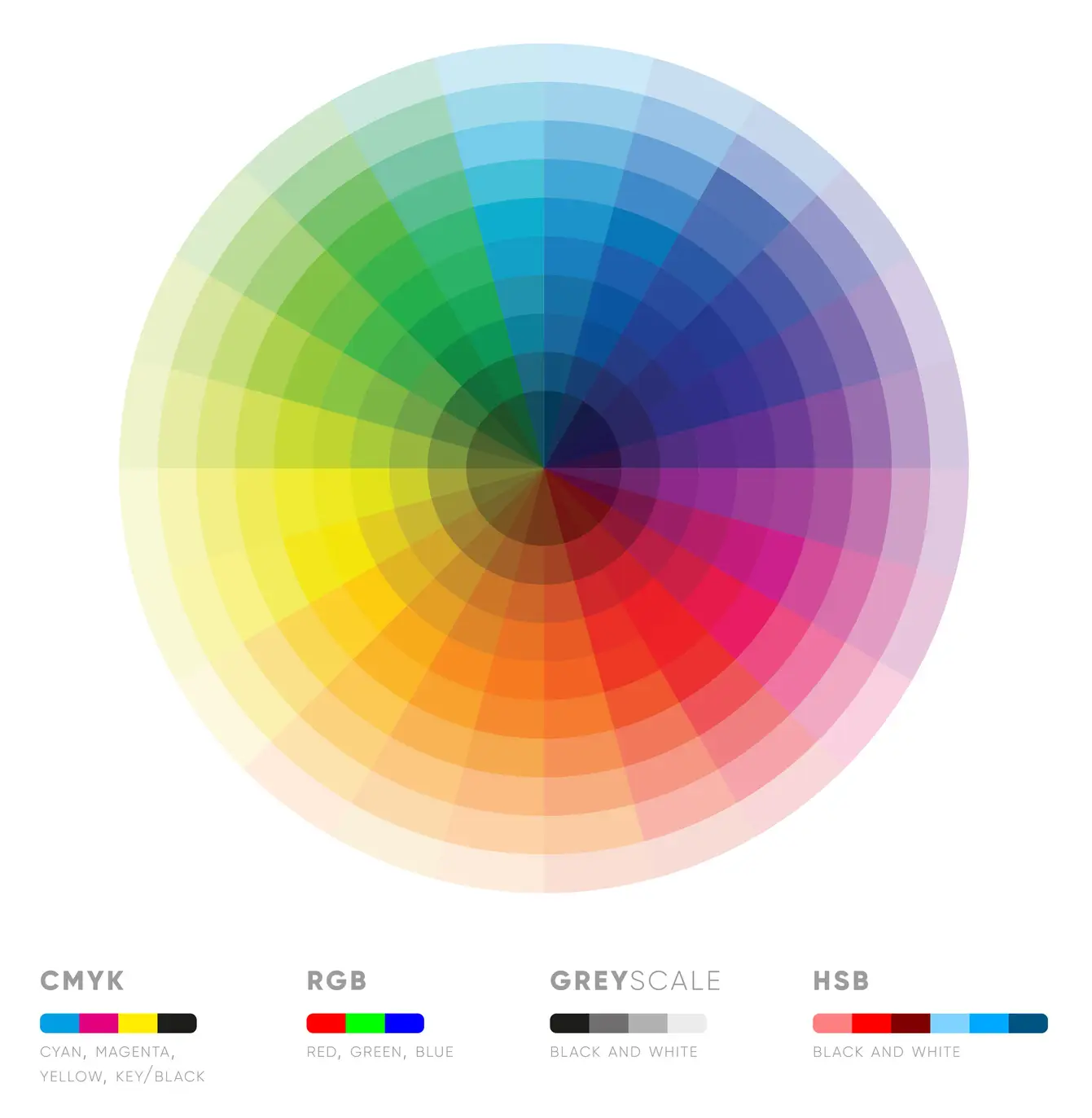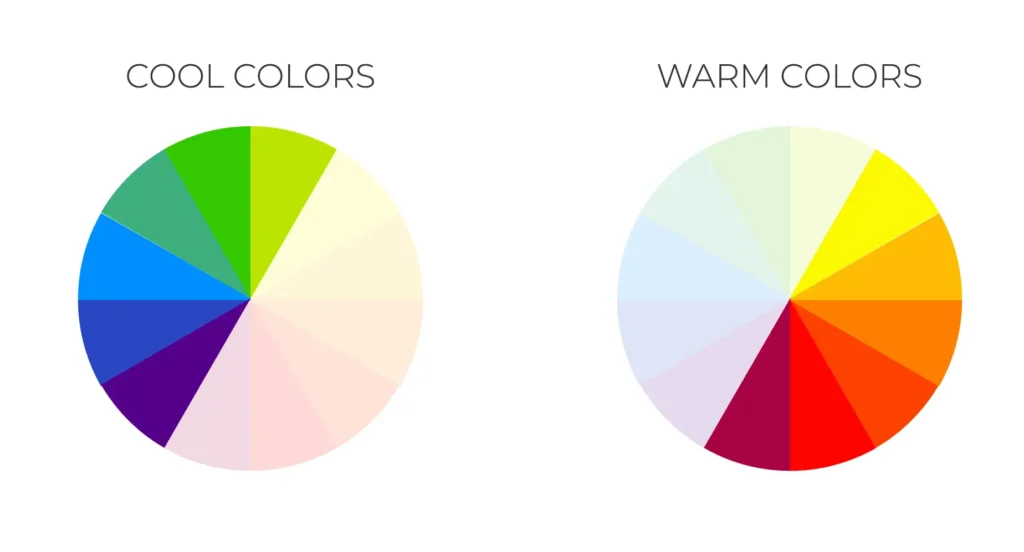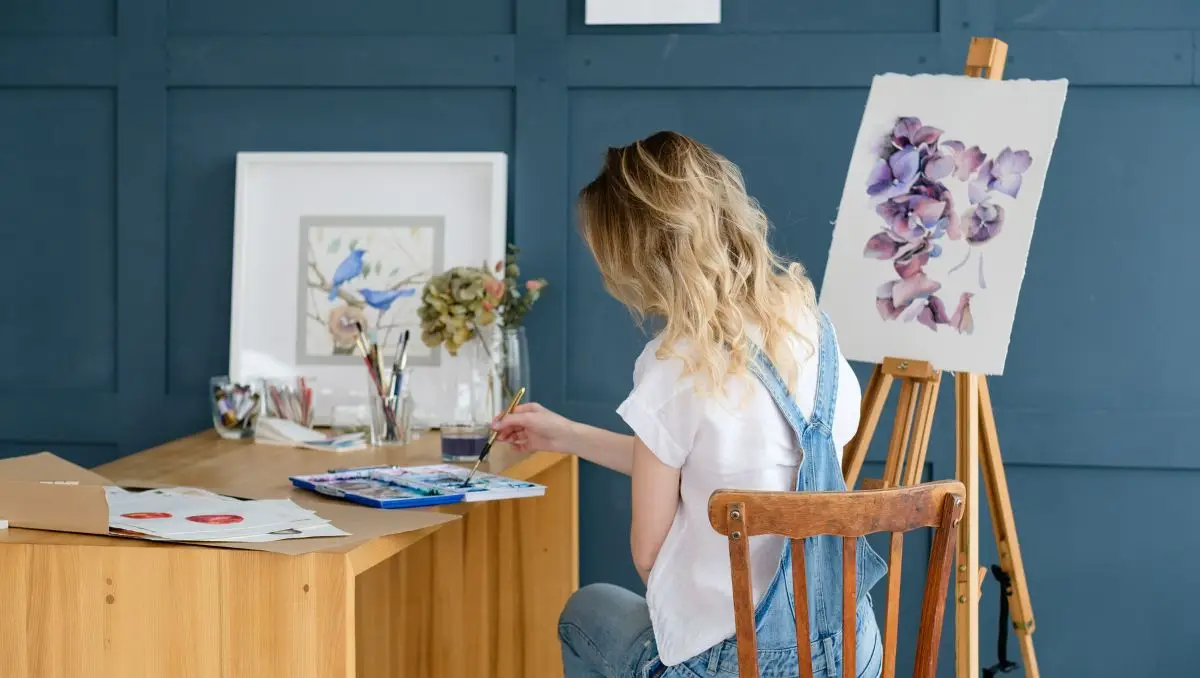Violet is a stunning purple color with high saturation. Using violet colors in your creative work will add an epic level of richness.
It’s been used throughout history and makes for a great color in painting, interior design, and fashion.
We go through its rich history, meanings, and best color combinations.

What Color Is Violet?

Violet is within the purple color range as it fits within the deeper, more saturated true purples.
The name of the color comes from the violet flower, where we get the color from.
It is the color of the shortest visible wavelength on the visible light spectrum, landing between blue and ultraviolet.
It was one of the seven basic colors first named by Newton when he discovered the division of visible light through a prism in 1672.
Violet is often confused with purple, but it refers to the actual colors that appear in the light spectrum, whereas purple refers to the color gotten by mixing red and blue light.
These two different sources are pierced quite similarly to humans, although their source is quite different neuro-biologically.
When using an RGB model, such as that used for TV screens, violet is usually accomplished by mixing red and blue light.
Similar to paint colors it is obtained by mixing red and blue paint.
Violet Color Names

There are countless color names surrounding violet, including others such as lilac, lavender color, and a periwinkle color.
For fruits and berries, there are the colors of blueberry, mulberry, plum, aubergine, and eggplant.
Violet itself has many specific names for variations of itself, including Persian Violet, Blue Violet, Red Violet, Pink Violet, Ultra Violet, African Violet, Chinese Violet, Japanese Violet, Spanish Violet, and Russian Violet.
Violet Color History

The history of violet begins as the name of the color given to the violet flower, called viola in the original Latin.
It was revered as a color because purple dye was exceptionally hard to manufacture, thus associating all purples with royalty and the elite.
To get the dye, you had to extract it from the murex shellfish, first produced in the city of Tyre, giving it the name Tyrian purple.
The Phoenicians gained much fame from this incredible dye, spreading its popularity first to Carthage and then to Romans.
Today, we see many paintings depicting high-status Romans with Tyrian purple, which has become almost synonymous with royalty.
By the middle ages, the catholic church had carried on the tradition of using violet in their coloring to depict their high status.
It was worn by bishops and university professors.
It became the color of the Virgin Mary’s clothes.
One of the biggest changes with purple happened in 1856 when mauveine dye was chemically created.
This meant purple could finally be mass-produced, and it was, leading eventually to the so-called ‘mauve decade’ in 1890.
In other parts of the world, purple and violet have different associations.
In Buddhism, it was associated with the Crown Chakra, one of the major spiritual centers of the body.
Ir represents the unity of Yin and Yang in China, making it one of the highest colors.
In modern-day America, most people see violet as an extravagant color, against Americans’ more pragmatic and less ostentatious sensibilities.
It can have a sense of individuality and creativity people respect though.
Violet Color Meaning

Violet combines with passion and power of red with the calm and stability of blue, making for an elegant, flowing color.
We already know its deeply associated with nobility, royalty, religion, and luxury due to its historical value and rarity.
However, in modern terms, its come to be associated with creativity, unconventionality, independence and thinking outside the box.
This is partly due to its rare nature, making it an ‘unnatural’ color in some ways.
Only a few flowers really show the color, including violet of course, but also lavender and lilac.
These tend to be delicate, beloved flowers.
There are also some purple fruits, generally rich berries such as blueberry and mulberry, as well as eggplant and plum.
In many cultures, violet has been associated with bravery, wisdom, and spirituality.
The purple heart in the US, for example, commends bravery with a bright purple.
Many religions, including Buddhism, Hinduism, and Catholicism, use purple for some of their highest-ranking members.
Violet Color Theory

Complimentary Colors

Violet’s direct complementary color is green.
You can find a color’s compliment by finding out what’s directly across from it on the color wheel.
Citrusy lemon yellows are a great contrast to violet’s deep purple, but you can also go for violet’s split complements to get more variety.
Split complements are the two colors adjacent to the complementary color on the color wheel. Thus, for violet, those colors are orange and bright green.
Together, the three make a beautiful set of citrusy colors that completely pop with the addition of violet.
Contrasting Colors

You can also go for a triadic color scheme when working with violet.
A triadic color scheme uses three colors that are equal distances apart to balance each other out on the color wheel.
To get the three colors, simply pick out our starter color, then build an equilateral triangle on the color wheel using that color as one of the three points.
The other two points will be the other two colors.
For violet, those colors are red and green.
The balance of these three together makes for a harmonious color scheme.
Is a Violet a Warm or Cool Color

Violet is inherently neutral in warmth or coolness.
Depending on the amount of blue or red added, it can easily become warm or cool-biased.
Violet Color Shades

Light Violet Color
| Color Name | Hex Code | RGB Code | CMYK Code |
| Light Violet | 7A5299 | 122, 82, 153 | 20, 46, 0, 40 |
Light violet is a slightly brighter shade of violet than the original color.
Dark Violet Color
| Color Name | Hex Code | RGB Code | CMYK Code |
| Dark Violet | 9400D3 | 148, 0, 211 | 19, 38, 0, 0 |
Dark violet is a slightly darker shade of violet, using more red and blue overall.
Persian Violet Color
| Color Name | Hex Code | RGB Code | CMYK Code |
| Persian Violet | 8c8eb2 | 140, 142, 178 | 25, 20, 0, 24 |
Persian violet is a greyer violet, adding a kind of more powdery yet darker elegance to the color.
Blue Violet Color
| Color Name | Hex Code | RGB Code | CMYK Code |
| Blue Violet | 4d1a7f | 77, 26, 127 | 39, 80, 0, 50 |
Blue-violet is closer to periwinkle than pure violet, adding much more blue.
Red Violet Color
| Color Name | Hex Code | RGB Code | CMYK Code |
| Red Violet | 953553 | 149, 53, 83 | 0, 64, 44, 42 |
Red violet is closer to a mauve color than pure violet, adding more red.
Pink Violet Color
| Color Name | Hex Code | RGB Code | CMYK Code |
| Pink Violet | CA226B | 202, 34, 107 | 0, 83, 47, 21 |
Pink violet is more saturated and brighter than regular violet, and, as the name suggests, much pinker.
UltraViolet Color
| Color Name | Hex Code | RGB Code | CMYK Code |
| Ultra Violet | 5f4b8b | 95, 75, 139 | 32, 46, 0, 45 |
Ultraviolet is a darker, more saturated violet with a much deeper amount of purple.
African Violet Color
| Color Name | Hex Code | RGB Code | CMYK Code |
| African Violet | b284be | 178, 132, 190 | 6, 31, 0, 25 |
African violet is a greyer yet deep violet, making for an elegant color.
Chinese Violet Color
| Color Name | Hex Code | RGB Code | CMYK Code |
| Chinese Violet | 856088 | 133, 96, 136 | 2, 29, 0, 47 |
A warmer, lighter violet that verges on aubergine looks like a light red wine.
Japanese Violet Color
| Color Name | Hex Code | RGB Code | CMYK Code |
| Japanese Violet | 5b3256 | 91, 50, 86 | 0, 45, 5, 64 |
Japanese violet is an intense plum color that verges on a purple burgundy.
A beautiful, deep color.
Spanish Violet Color
| Color Name | Hex Code | RGB Code | CMYK Code |
| Spanish Violet | 4c2882 | 76, 40, 130 | 42, 69, 0, 49 |
A rich, saturated violet, verging on a slightly warmer color.
Russian Violet Color
| Color Name | Hex Code | RGB Code | CMYK Code |
| Russian Violet | 32174d | 50, 23, 77 | 35, 70, 0, 70 |
Russian violet is an intense purple.
Violet Color Combinations
Violet and Blue
| Color Name | Hex Code | RGB Code | CMYK Code |
| Violet | 8f00ff | 143, 0, 255 | 44, 100, 0, 0 |
| Blue | 0000ff | 0, 0, 255 | 100, 100, 0, 0 |
Deep violet pairs well with a medium to light blue, both bringing a cool, feminine feeling to a space.
It’s a great pair for a tranquil, calming space.
Violet and Brown
| Color Name | Hex Code | RGB Code | CMYK Code |
| Violet | 8f00ff | 143, 0, 255 | 44, 100, 0, 0 |
| Brown | 964b00 | 150, 75, 0 | 0, 50, 100, 41 |
For a more sophisticated, electric scholar look, you can pair violet with brown woods.
The pair is interesting enough to draw attention while still feeling cozy.
Violet and Dark Grey
| Color Name | Hex Code | RGB Code | CMYK Code |
| Violet | 8f00ff | 143, 0, 255 | 44, 100, 0, 0 |
| Dark grey | a9a9a9 | 169, 169, 169 | 0, 0, 0, 34 |
Slate and stone greys make a powerful, spiritual pairing with dark violet.
The natural anchor brings out the energy in the color, almost like lavender or violet flowers placed on a stone background.
Very modern and meditative.
Violet and Pale Green
| Color Name | Hex Code | RGB Code | CMYK Code |
| Violet | 8f00ff | 143, 0, 255 | 44, 100, 0, 0 |
| Pale green | 98fb98 | 152, 251, 152 | 39, 0, 39, 2 |
Another clash of nature and the eclectic purple and pale green generally create a beautiful contrast with each other, but a pale violet really adds to this effect.
Violet and Mustard
| Color Name | Hex Code | RGB Code | CMYK Code |
| Violet | 8f00ff | 143, 0, 255 | 44, 100, 0, 0 |
| Mustard | FFDB58 | 255, 219, 88 | 0, 14, 65, 0 |
A power couple, these two make a huge statement in a room, being powerful contrasting colors.
Not for the faint of heart, this funky combination can look extremely contemporary when done right.
Violet and Cream
| Color Name | Hex Code | RGB Code | CMYK Code |
| Violet | 8f00ff | 143, 0, 255 | 44, 100, 0, 0 |
| Cream | fffdd0 | 255, 253, 208 | 0, 1, 18, 0 |
A classy, sophisticated combination, violet and cream goes back to Roman times and can still be used in Mediterranean weddings today.
A powerful, stately combination that never goes out of style.
How to Make Violet Color
- Mix equal parts red and blue.
- Then, add half as much white.
- Mix thoroughly for a rich, violet color.
How is Violet Different than Other Common Colors
Violet Color vs Purple
| Color Name | Hex Code | RGB Code | CMYK Code |
| Violet | 8f00ff | 143, 0, 255 | 44, 100, 0, 0 |
| Purple | a020f0 | 160, 32, 240 | 33, 87, 0, 6 |
Violet is a brighter, more saturated purple, whereas purple is a more medium pure purple.
Violet Color vs Indigo
| Color Name | Hex Code | RGB Code | CMYK Code |
| Violet | 8f00ff | 143, 0, 255 | 44, 100, 0, 0 |
| Indigo | 4b0082 | 75, 0, 130 | 42, 100, 0, 49 |
Indigo is a deeper, darker, much more blue-biased purple than violet.
Violet Color vs Lavender Color
| Color Name | Hex Code | RGB Code | CMYK Code |
| Violet | 8f00ff | 143, 0, 255 | 44, 100, 0, 0 |
| Lavender | e6e6fa | 230, 230, 250 | 8, 8, 0, 2 |
Lavender is a more pale purple compared with the more saturated violet.
Violet Color vs Royal Purple
| Color Name | Hex Code | RGB Code | CMYK Code |
| Violet | 8f00ff | 143, 0, 255 | 44, 100, 0, 0 |
| Royal Purple | 7851a9 | 120, 81, 169 | 29, 52, 0, 34 |
Royal purple is a deeper, richer purple than regular violet.
Violet Color vs Magenta
| Color Name | Hex Code | RGB Code | CMYK Code |
| Violet | 8f00ff | 143, 0, 255 | 44, 100, 0, 0 |
| Magenta | ff00ff | 255, 0, 255 | 0, 100, 0, 0 |
Magenta is a much brighter, pinker color than violet.
Violet Color vs Lilac Color
| Color Name | Hex Code | RGB Code | CMYK Code |
| Violet | 8f00ff | 143, 0, 255 | 44, 100, 0, 0 |
| Lilac | c8a2c8 | 200, 162, 200 | 0, 19, 0, 22 |
Lilac is a paler, less saturated purple than violet.
Violet Color vs Orchid Color
| Color Name | Hex Code | RGB Code | CMYK Code |
| Violet | 8f00ff | 143, 0, 255 | 44, 100, 0, 0 |
| Orchid | da70d6 | 218, 112, 214 | 0, 49, 2, 15 |
Orchid is a much more pink color than violet with a tinge of purple.
Violet Color vs Plum
| Color Name | Hex Code | RGB Code | CMYK Code |
| Violet | 8f00ff | 143, 0, 255 | 44, 100, 0, 0 |
| Plum | 8e4585 | 142, 69, 133 | 0, 51, 6, 44 |
Plum is a deeper, more saturated, and richer purple than violet.
Violet Color in Interior Design

Violet has had a resurgence recently, with Pantone selecting its color Ultra Violet in 2018.
It has been seen extensively in fashion, design, and the arts.
Violet can add a feeling of royalty, peace, and spirituality to any room. It can be dramatic, luxurious, and sophisticated.
It’s popular in bathrooms, hallways, or even living rooms.
You can also go dramatic in a studio or home office if you are into that.
Modern interior design allows for a lot of color, with purples being suitable for almost room, gender, or age.
Violet, in large doses can be used for a powerful wow factor, increasing the drama of any room with the bold color.
Or, with paler shades, it can be used as a soothing, meditative accent color.
Violet pairs well with metallics, creating an inviting sense of luxury and shine.
On a couch or armchair, it can become a signature color.
The color works best with greens, browns, and greys in interior design.
Another popular choice is using violet as an accent wall color.
The bright color is usually too much for all the walls in a room but can add a huge statement piece as one wall in a room.
Other options include violet furniture, violet wallpaper patterns, and window curtains.
Conclusion
Violet is a great, powerful purple that has been gaining rising popularity.
We’ve gone over all the many variations on the color, what works with the color as a color scheme, and how to work with it in painting and interior design.
Violet Colors FAQ
What’s the difference between violet and purple?
Violet is a specific wavelength of light between 380nm to 450nm, whereas purple is a mixture of red and blue wavelengths. To our eyes, these are similar in coloration but come from different sources.
What is the violet color meaning?
Violet is associated with royalty, luxury, and power due to the historical rarity of purple dye. It has also represented creativity, wisdom, dignity, mystery, and being eclectic.
What colors make violet?
You can create a violet color when painting by mixing red and blue with some white. Depending on the shade you’d like, you will have different variations of these colors.

